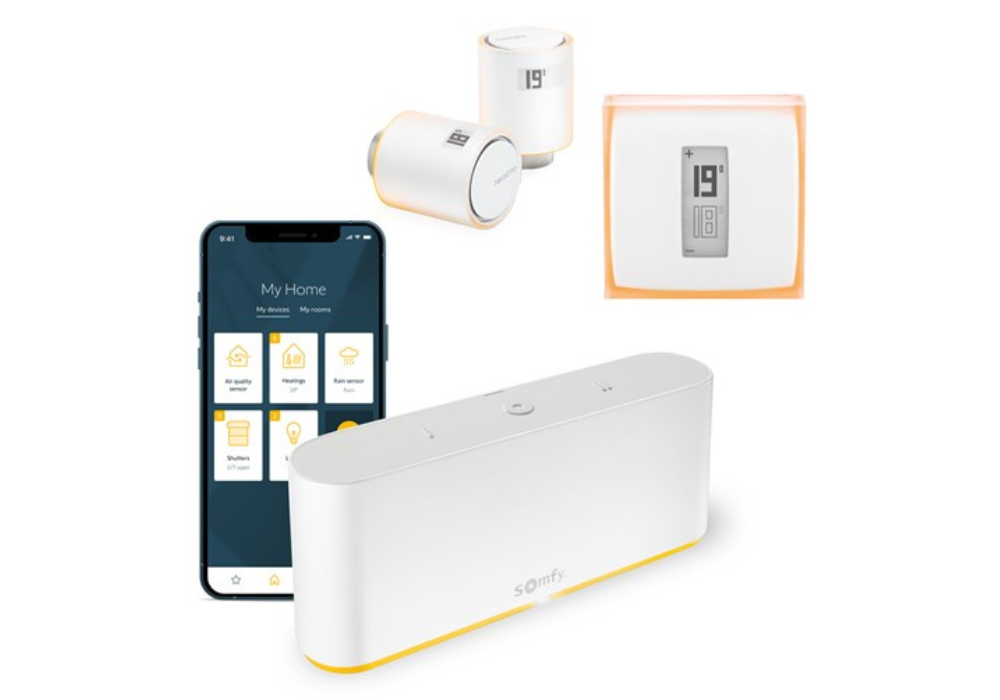
Netatmo og Somfy udvider deres smarte samarbejde

Previously, a representative from your electricity supplier would need to come to your home to take regular meter readings of your energy consumption. This was the case for all homes that had standard electricity meters, dial electricity meters, variable rate electricity meters, and so on.
Increasingly, smart meters are being installed in homes up and down the UK to automate this process. With smart electricity meters, it’s much easier to monitor your own electricity consumption at home. This helps consumers to be more conscious about their energy usage and their impact on the environment.
Smart meters also cut out the manual reading process, meaning your electricity supplier can bill you regularly and accurately based on your actual electricity consumption. This eliminates the lock-in many consumers used to experience with pre-payment electricity meters, where their electricity billing may not have reflected their actual energy consumption levels.
Smart electricity meters work by taking automatic meter readings to collect your consumption data. This smart metering setup is directly linked to your customer account with your energy supplier, so they can bill you based on your electricity usage.
Your smart meter might record your energy consumption based on hourly consumption data or daily consumption data - it depends on the specific setup for your meter. In the UK, your smart meter customer consumption information is transferred to your power supply company by an entity called the Data Communications Company (DCC).
The DCC handles consumption data for all homes that have smart meters installed across the UK electricity network, ensuring your accurate meter readings reach your power supply company for billing purposes.
You should be able to access all your smart meter readings and consumption information in your online customer account that’s linked to your power supply company.
As with traditional electricity meters, it’s your power supply company that owns the smart electricity meter that is installed in your home. So, your electricity supplier is responsible for installing, servicing and replacing your smart meter as needed.
This means you should keep an eye on your smart meter to ensure it’s functioning correctly - if not, you should let your power supplier know as soon as possible. In general, smart meters have a lifespan of 15-20 years.
Your power company will be able to install a smart meter in your home in a quick and easy process. From that point on, all your meter readings and consumption data will be automatically uploaded to your customer account, simplifying the entire electricity usage process from consumption to billing.
Smart meters allow your power company to accurately calculate your electricity bill based on your consumption data. As they’re automatic rather than manual meter readings, it’s a hassle-free and accurate process.
All power companies in the UK have been asked by the government to take all reasonable steps to ensure that all the households they supply power to have smart meters installed by 2024. That means that you’ll have a range of choice for your power supply if you’re using a smart meter to track your consumption data.
You can access your smart meter readings and consumption data via your customer account with your power company, so you can monitor how much electricity you’re using and how much it’s costing you. You might want to view daily consumption data or hourly consumption data from your smart meter, as well as requesting personalised advice from your power supplier about how to optimise your electricity consumption.
Smart meters do allow your power supplier to access more detailed facets of your consumption data. However, all this is in line with the General Data Protection Regulation (GDPR). You’ll be able to see the consumer information that your smart meter collects via your customer account with your power supplier.
As we saw above, a smart meter installed in your home will actually belong to your power supply company. As the installation of smart meters is key to upgrading and modernising the UK electricity network in general, your power company will cover the costs of installing and maintaining your smart meter.
While the UK government aims to have smart meters monitoring all home electricity consumption data by 2024, you can opt out of having a smart meter installed in your home.
However, it’s important to note that, in future, power companies may offer the most affordable rates only to households that do have a smart meter installed. Plus, if you stick with your standard meter, you may be at risk of over-billing by an outdated consumption information reading system.
Overall, installing a smart meter in your home is an intelligent decision to optimise your future electricity consumption. With automated meter readings that transfer your consumption data directly to your power company, you'll receive accurate, fair billing based on your actual electricity consumption. Plus, you’ll be able to monitor your consumption data via your customer account, giving you insight into your power usage and impact on the environment.